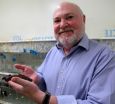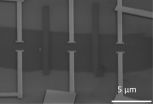Research shows E.B. White was right in 'Charlotte's Web'
The spider shows the other kind of humble
2014-12-19
(Press-News.org) Before Charlotte the spider spelled the word "humble" in her web to describe Wilbur the pig, she told Templeton the rat that the word meant "not proud."
That's probably what most people say if you put them on the spot. But if you give them time to think about it deeply, like a new study just did, other themes emerge that have a lot to do with learning.
And these intellectual dimensions of humility describe the spider as well or better than the pig.
"Wilbur has many of the dimensions of humility in general: regard for others, not thinking too highly of himself - but highly enough," said Peter Samuelson, the lead study author. "Charlotte shows some of the unique aspects of intellectual humility: curiosity, love of learning, willingness to learn from others."
Samuelson is a psychologist at Fuller Theological Seminary who embarked on a new voyage for academia: a bottom-up exploration of what it really means to be humble. Samuelson teamed up with Brigham Young University psychologist Sam Hardy.
For his part, Hardy utilized a statistical technique called multi-dimensional scaling that made sense of open-ended responses from the 350 study participants recruited from Amazon's "Mechanical Turk."
"This is more of a bottom-up approach, what do real people think about humility, what are the lay conceptions out there in the real world and not just what comes from the ivory tower," Hardy said. "We're just using statistics to present it and give people a picture of that."
Hardy's analysis found two clusters of traits that people use to explain humility. Traits in the first cluster come from the social realm: Sincere, honest, unselfish, thoughtful, mature, etc. The second and more unique cluster surrounds the concept of learning: curious, bright, logical and aware.
Samuelson says the two clusters of humble traits - the social and intellectual - often come as a package deal for people who are "intellectually humble." Because they love learning, they spend time learning from other people.
"In many ways, this is the defining feature of intellectual humility and what makes it distinct from general humility," said Samuelson, who formerly served as a Lutheran pastor prior to his academic career.
The new study appears in The Journal of Positive Psychology.
INFORMATION:
ELSE PRESS RELEASES FROM THIS DATE:
2014-12-19
The sun emitted a mid-level flare on Dec. 18, 2014, at 4:58 p.m. EST. NASA's Solar Dynamics Observatory, which watches the sun constantly, captured an image of the event. Solar flares are powerful bursts of radiation. Harmful radiation from a flare cannot pass through Earth's atmosphere to physically affect humans on the ground, however -- when intense enough -- they can disturb the atmosphere in the layer where GPS and communications signals travel.
To see how this event may affect Earth, please visit NOAA's Space Weather Prediction Center at http://spaceweather.gov, ...
2014-12-19
New UCLA research indicates that lost memories can be restored. The findings offer some hope for patients in the early stages of Alzheimer's disease.
For decades, most neuroscientists have believed that memories are stored at the synapses -- the connections between brain cells, or neurons -- which are destroyed by Alzheimer's disease. The new study provides evidence contradicting the idea that long-term memory is stored at synapses.
"Long-term memory is not stored at the synapse," said David Glanzman, a senior author of the study, and a UCLA professor of integrative ...
2014-12-19
Not all species may suffer from climate change. A new analysis shows that Dolly Varden, a species of char common in southeast Alaska, adjust their migrations so they can keep feasting on a key food source - salmon eggs - even as shifts in climate altered the timing of salmon spawning.
The resiliency of species to climate change may depend on how well they adapt to climate-driven changes in their food and habitat, such as altered growth of plants they feed on. A mismatch in timing between predators and the availability of prey could cause some species to lose access to ...
2014-12-19
About 15 percent of women in the United States suffer from anxiety disorders and depression during their pregnancies, and many are prescribed antidepressants. However little is known about how early exposure to these medications might affect their offspring as they mature into adults.
The answer to that question is vital, as 5 percent of all babies born in the U.S. - more than 200,000 a year - are exposed to antidepressants during gestation via transmission from their mothers.
Now, a UCLA team has studied early developmental exposure to two different antidepressants, ...
2014-12-19
HOUSTON - (Dec. 19, 2014) - An atomically thin material developed at Rice University may lead to the thinnest-ever imaging platform.
Synthetic two-dimensional materials based on metal chalcogenide compounds could be the basis for superthin devices, according to Rice researchers. One such material, molybdenum disulfide, is being widely studied for its light-detecting properties, but copper indium selenide (CIS) also shows extraordinary promise.
Sidong Lei, a graduate student in the Rice lab of materials scientist Pulickel Ajayan, synthesized CIS, a single-layer matrix ...
2014-12-19
PROVIDENCE, R.I. [Brown University] -- Neutrophils, a type of white blood cell, are the immune system's all-terrain vehicles. The cells are recruited to fight infections or injury in any tissue or organ in the body despite differences in the cellular and biochemical composition. Researchers from Brown University's School of Engineering and the Department of Surgery in the Warren Alpert Medical School collaborated to devise a new technique for understanding how neutrophils move in these confined spaces.
The technique involves two hydrogel sacks sandwiched together with ...
2014-12-19
PHILADELPHIA - (Dec. 19, 2014) - A common polymorphism - a variation in a person's DNA sequence that is found with regularity in the general population - can lead to a chain of events that dictates how a tumor will progress in certain types of cancer, including a form of breast cancer as well as ovarian cancer, according to new research from The Wistar Institute that was published online by the journal Cancer Cell.
The research reveals a more explicit role about the symbiotic relationship humans have with the various bacteria that inhabit our body and their role during ...
2014-12-19
(Edmonton) For millions of people around the world, televised medical talk shows have become a daily viewing ritual. Programs such as The Dr. Oz Show and The Doctors have attracted massive followings as charismatic hosts discuss new medical research and therapies while offering viewers their own recommendations for better health. For show producers it's a winning ratings formula, but for viewers eager for a healthier life, the results aren't so clear cut.
"The research supporting any of these recommendations is frequently absent, contradictory or of poor quality," says ...
2014-12-19
Women whose loved ones are critical of their weight tend to put on even more pounds, says a new study on the way people's comments affect our health.
Professor Christine Logel from Renison University College at the University of Waterloo led the study, which appears in the December issue of the journal Personal Relationships.
"When we feel bad about our bodies, we often turn to loved ones--families, friends and romantic partners--for support and advice. How they respond can have a bigger effect than we might think," said Professor Logel, who teaches social development ...
2014-12-19
WASHINGTON D.C., December 19, 2014 - Researchers at Montana State University and Brandenburg University of Applied Sciences in Germany have created a simple mathematical model based on optical measurements that explains the stunning colors of Yellowstone National Park's hot springs and can visually recreate how they appeared years ago, before decades of tourists contaminated the pools with make-a-wish coins and other detritus.
The model, and stunning pictures of the springs, appear today in the journal Applied Optics, which is published by The Optical Society (OSA).
If ...
LAST 30 PRESS RELEASES:
[Press-News.org] Research shows E.B. White was right in 'Charlotte's Web'
The spider shows the other kind of humble







